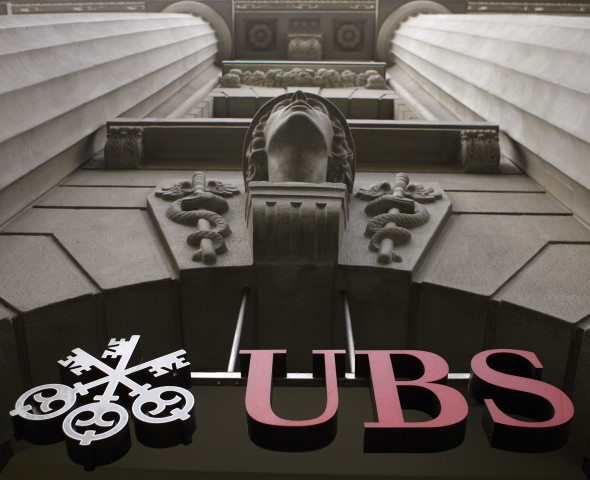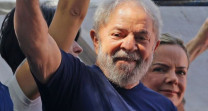Switzerland probes banks over possible forex rigging
Recently, a global investigation into the rigging of benchmark interest rates led to UBS being fined $2.7 billion.

Recently, a global investigation into the rigging of benchmark interest rates led to UBS being fined $2.7 billion. PHOTO: REUTERS
Regulators and investors are concerned about the integrity of financial benchmarks in the wake of a global investigation into the rigging of benchmark interest rates that has so far led to four financial firms, including Switzerland's largest bank UBS, being fined around $2.7 billion and seven men being charged.
"FINMA (Swiss Financial Market Supervisory Authority) is currently conducting investigations into several Swiss financial institutions in connection with possible manipulation of foreign exchange markets," the Swiss regulator said in a statement on Friday.
"FINMA is coordinating closely with authorities in other countries as multiple banks around the world are potentially implicated."
Switzerland's competition commission WEKO also on Friday said it had opened a preliminary investigation after learning about potential manipulation of foreign exchange markets by banks. They declined to name the banks under investigation.
The Swiss federal prosecutor's office said it was in contact with FINMA about the issue.
UBS and Credit Suisse declined to comment. Zuercher Kantonal Bank said the bank was currently not aware of a FINMA investigation. Marc Buerki, CEO of Swiss foreign exchange broker Swissquote, said it was not part of the investigation.
Britain's Financial Conduct Authority (FCA) said in June it was examining allegations banks had manipulated foreign exchange benchmarks by trading ahead of their own customers' orders, a practice known in the markets as "front running".
A spokesperson for the FCA declined to say whether it was working with FINMA on its probe.
A spokesperson for the Hong Kong Monetary Authority said the HKMA did not comment on supervisory work with other authorities.
"The HKMA will closely monitor the developments," she said.
The US Commodity Futures Trading Commission could not be reached for comment because of the government shutdown. The US Department of Justice declined comment.
With probes already underway into benchmarks for crude oil and the swaps market as well as Libor interest rates, global regulators recently published principles to improve the transparency and oversight of hundreds of financial benchmarks, covering everything from interest rates to gold.
The biggest market
The key foreign exchange benchmark rates, WM/Reuters, are calculated using actual trades hourly through most of the trading day, with closing rates "fixed" at 4 pm in London.
Many banks provide a service to their customers where they guarantee to trade at the WM/Reuters rates. It is useful for buyside investors like large funds to value and benchmark their portfolios because most main stock and bond index compilers use these rates for their calculations.
Corporates also use the WM/Reuters rates to value currency holdings worldwide at a uniform rate. Auditors accept the WM/Reuters rates as independently fixed.
The WM/Reuters benchmark rates cover 160 currencies. Data from Thomson Reuters systems are a primary source of the exchange rates used to calculate the benchmarks. World Markets, a unit of Boston-based State Street Corp., applies its methodology and calculates the benchmark.
A report by Bloomberg in June said traders at some of the world's biggest banks had used their advance knowledge of customer orders to push through trades before and during the 60-second window when the WM/Reuters benchmark rates are set.
The report said traders had colluded with counterparts at other banks to boost their chances of moving the rates.
The currency market, the biggest market in the financial system, is one of the least regulated with most trading taking place away from exchanges.
Currency traders contacted by Reuters said it was unsurprising that dealers tried to profit from advance knowledge of client orders but given the size of the market, manipulating the benchmarks would be difficult unless the trader had a very large order or was dealing in two rarely traded currencies.
While hundreds of banks participate in the foreign exchange market, four players dominate, with a combined share of more than 50 percent, according to a May survey by Euromoney Institutional Investor. Germany's Deutsche Bank is No. 1, with a 15 per cent share, followed by Citigroup with 14.9 per cent, Britain's Barclays with 10 per cent and UBS with 10 per cent.
State Street said in a statement: "WM supports efforts by the industry to determine and address any alleged disruptive behaviour by market participants. We welcome further discussions on these issues and what preventative measures can be adopted."
It said the spot fixings for major currency pairs used actual executed trade data, or in certain circumstances, order rates.
"The process for capturing this information and calculating the spot fixings is automated and anonymous and the rates are monitored for quality and accuracy," the statement said.
Thomson Reuters declined to comment.



















COMMENTS
Comments are moderated and generally will be posted if they are on-topic and not abusive.
For more information, please see our Comments FAQ